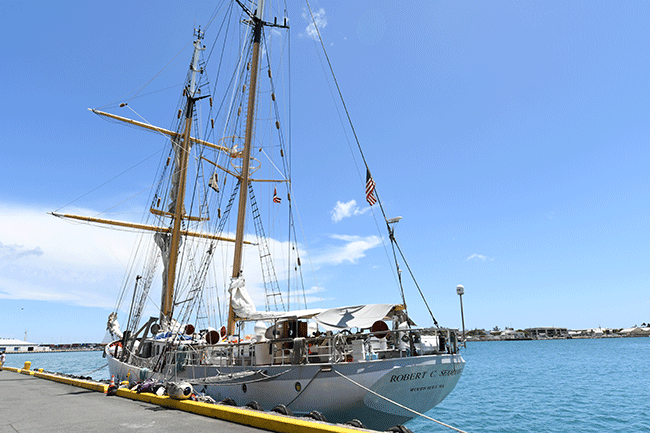Programs Blog
Last Day in Port

Ship’s Log
Current Position
Princes Wharf, Auckland
Ship’s Heading and Speed
N/A
Weather
Warm and breezy with occasional altocumulus clouds
Hello from Nicole (A watch) and Rachel (B watch)!
We started day three early with our very first watch rotation: midnight-0100 for Nicole (with Mathilde and sailing intern Neil) and 0500-0600 for Rachel (with Sarah and 2nd scientist Emily). The watch before ours woke us up about ten minutes before we needed to be on deck.
Wakeups on the ship are a strategic process. We don’t want to shake the person’s arm and startle them, or call their name too loudly and wake up everyone else around them, too, so we stand outside their bunk and softly say their name until they give a verbal response. Then we tell them who we are, why we’re waking them up, what time it is, and what the weather looks like. I (Nicole) never thought somebody could wake me up just by whispering—anyone who’s ever woken me up can vouch for that—but this tried-and-true wakeup technique really works.
During overnight watch, pairs of students did our hourly boat check, supervised by another crew member. We walked around the deck and through the dry storage and engine room, looking out for hazards and observing things like the boat’s fuel level and water pressure. We also learned how to check the weather by determining wave direction and height, wind direction, cloud cover and type, and temperature. At the end of boat check, we recorded our findings in the logbook.
The day started for real with wakeups at 0620. After a delicious breakfast of pumpkin pancakes, yogurt, and sausage, we did our morning chores and made sandwiches to bring on our onshore field trip with chief anthropologist Jeff. We took the city bus to the indigenous Māori community of Ngati Whatua Orakei, where we met with our lovely tour guide, Paora. Ngati Whatua Orakei also houses a memorial for New Zealand Prime Minister Joseph Savage, the first Prime Minister to recognize and work with the Māori people. Paora, a traditional healer, shared pre- and post-colonial Māori history from the perspective of his own tribe and taught us about some of the medicinal plants and techniques still in use today.
We had a free hour after the tour. Many of us took our first sailor showers, during which you turn the shower on, get yourself wet, turn the water off, soap up, turn the water back on, and rinse. It’s an interesting experience, especially the first time.
Orientation continued after free time. We learned the basics of sail handling, how to use some of the lab equipment, what to (and not to) do in the chart house, and how to furl the jib. Experienced crew spent a lot of the orientation time reviewing knots with us, but we (Nicole and Rachel specifically) are going to need to spend some more time practicing the slipped reef knot we used while furling the jib.
Three guests joined us for dinner on the ship: journalist Kennedy Warne, his son Jeremy, and Sue Neureuter. Most of us sat on the quarterdeck with our visitors, talking about the environmental issues we’ve learned about during our two shore components, including New Zealand’s plan to eliminate rats, stoats, and weasels by 2050, the Zero Carbon Act that the country passed last week, and the industries and regions that are most directly threatened by climate change.
It’s been a long but exciting day. We’ve had a great time in port, but we can’t wait to get underway tomorrow.
Peace and blessings,
Nicole and Rachel
Recent Posts from the Ships
- Ocean Classroom 2024-A collaborative high school program with Proctor Academy
- Collaborations and Long-term Commitments: SEA’s Caribbean Reef Program Sets a Course for Coastal Programs that Compliment Shipboard Experiences.
- Sea Education Association students prepare for life underway using state of the art nautical simulation from Wartsila Corporation.
- SEA Writer 2022, Magazines From the Summer SEA Quest Students
- Technology@SEA: Upgrades Allow Insight into Ocean Depths
Programs
- Gap Year
- Ocean Exploration
- High School
- Science at SEA
- SEA Expedition
- SEAScape
- Pre-College
- Proctor Ocean Classroom
- Protecting the Phoenix Islands
- SPICE
- Stanford@SEA
- Undergraduate
- Climate and Society
- Climate Change and Coastal Resilience
- Coral Reef Conservation
- Marine Biodiversity and Conservation
- MBL
- Ocean Exploration: Plastics
- Ocean Policy: Marine Protected Areas
- Oceans and Climate
- Pacific Reef Expedition
- The Global Ocean: Hawai'i
- The Global Ocean: New Zealand